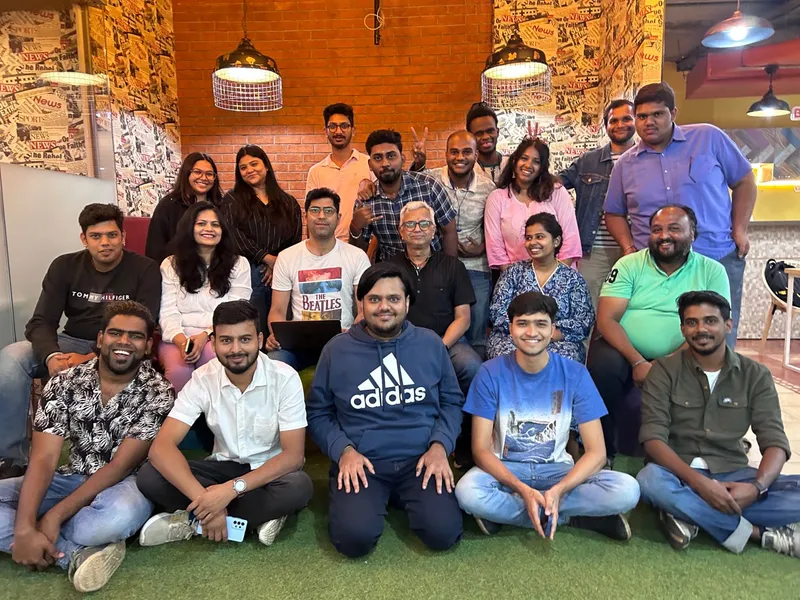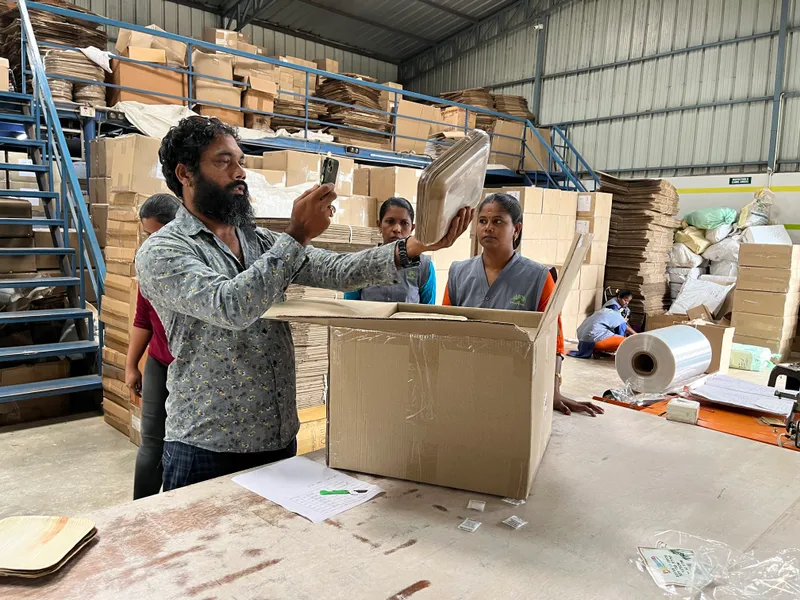How two friends-turned-entrepreneurs built a successful areca plate export business
Arbhu Enterprises uses a decentralised manufacturing process to supply eco-friendly products like areca plates to global brands.
Amit Subodh, a resident of Bihar, was working as a sales executive with YourStory Media around 2014-15 in Bengaluru. During this time, he met Gulshan Iyer, who was running a venture called Gullu’s Kitchen. Their frequent interactions fostered a strong connection between them.
Iyer's family was involved in areca plate manufacturing in Tamil Nadu, and he identified a strong demand for these eco-friendly plates in the West. He then invited Subodh to join the business, Arbhu Enterprises, to transition it into an export-oriented business.
Subodh decided to quit his job as a Senior Sales Manager at Talview to join Arbhu as a co-founder in 2020 to manage sales and operations.
Iyer’s father, Arvind Kumar, who worked as an auditor for the Government of India for 30 years, also joined the company as a co-founder.
was formally registered in 2018. The Bengaluru-based company manufactures areca plates and other eco-friendly products.
Areca plates, made from the fallen leaves of Areca palm tree, are an eco-friendly alternative to plastics, and have gained worldwide popularity as they are 100% biodegradable.
The friends-turned co-founders have now grown Arbhu into a successful business, and have shipped 20 million areca plates to businesses in the US and the UK since inception. The company shipped around 5 million plates in FY23.

Team Arbhu
Working on its B2B model, Arbhu made a revenue of Rs 35 lakh in 2019-20, which grew to Rs 1.5 crore and Rs 5 crore in the subsequent years. The company’s revenue stood at Rs 7.5 crore in FY23.
Collaborating with smaller manufacturers
Subodh says, they recognised small clusters in the villages of Tamil Nadu and Karnataka where areca plates are manufactured. These facilities are relatively basic, primarily employing small, hand-operated machines.
“At some places, the state government makes the machines available to generate employment opportunities. This leads to the establishment of small units where people manufacture these plates,” he says.
The founders identified gaps in these facilities, recognising opportunities to enhance efficiency, improve product quality, introduce quality checking processes, advance technology, and upgrade machinery.

“Instead of just being buyers, Arbhu started investing in these factories. We initially started working with three factories in Tamil Nadu, and now we have a network of four factories and many smaller clusters where our products are manufactured,” says Subodh.
The factories are located in Tumakuru and Bhadravati in Karnataka, and Coimbatore and Sathyamangalam in Tamil Nadu. Arbhu has also invested in a firm in Tripura to make bamboo-based products. It works with manufacturing facilities in Uttar Pradesh to make paper products and with factories in Gujarat to make bagasse plates (made from sugarcane).
Arbhu also has a warehousing unit in Chennai where the packaging is done.
The company made an initial investment of around Rs 5 lakh in these factories, covering the procurement of raw materials and upgrading the machinery. The investments majorly covered the working capital of the factories. Arbhu invested in various moulds for machines to produce plates and cutlery in different shapes and sizes.
“Recognition from the Federation of Indian Export Organisations (FIEO) also helped in some collaborations. We met potential partners during workshops who were interested in working with us. We helped them get machines from the government through Mudra Yojana,” says Subodh.
Decentralised approach in manufacturing
Talking about the decentralised approach, Subodh explains that a single machine can produce approximately 200 plates in a day, resulting in an output of 6,000 plates per month. However, after undergoing rigorous quality inspections, the effective efficiency is reduced to 4,000 plates.
Considering that a 40-ft container exported by Arbhu can hold anywhere between 3 lakh to 5 lakh plates, it becomes evident that no single manufacturer can achieve this scale with just one factory.
“This approach does entail risk as we accept orders from a single customer while procuring the products from various sources. To address this, we've established highly effective quality control procedures that are implemented at every stage, starting from leaves procurement through production and packaging,” says Subodh.

The products are tested for dust, damage, folding, colour, thickness difference, and so on, by an internal inspection team. The workers are also trained to segregate products and identify defects. The manufacturing process is ISO-certified and third-party inspections are also carried out by the clients.
Some of Arbhu’s competitors include Magnus and EcoSoul, which are both funded companies. BK Impex, a Gujarat-based manufacturer, is also a competitor.
“We work together with our competitors. Sometimes, we supply to them and sometimes they supply to us in case something needs to be outsourced,” says Subodh.
Building an export business
Initially, the team didn’t engage in direct exports, but instead identified buyers who were engaged in export business.
As the founders delved deeper into the global demand for areca plates, it became evident that this endeavor could become a full-time pursuit. However, there were challenges.
“The first challenge we faced was building trust among international clients,” says Subodh. Arbhu made many videos showcasing the products as well as the manufacturing process. This made it easier for brands to trust the company.
Some of the brands that it supplies to include BTBC, Palm Naki, Naturally Chic, HomeCht, and Truly Eco. BTBC’s areca products have received an average 4.7 star rating on Amazon from more than 1,000 customers.
Arbhu’s supply chain extends beyond India to the US, where the company maintains warehouses. Approximately 90% of the sales originate from the US, where it also facilitates customs clearance for the clients.
“Our strategy places a strong emphasis on order consolidation as a means to decrease shipping expenses, leading to reduced prices for the clients. We also extend marketing support to other businesses,” says Subodh.
Other than areca plates and cutleries, Arbhu has also expanded its product line to include bamboo brushes, straws, paper cups, neem wood comb, coconut bowls, and other eco-friendly products, which are now exported.
It has a team of 18 full-time employees and a network of 500 people involved in manufacturing in different factories.
In the coming years, Arbhu aims to broaden its product range further using its decentralised manufacturing model. The long-term vision is to develop a B2B cross-border ecommerce platform for eco-friendly products made in India.
Edited by Megha Reddy







